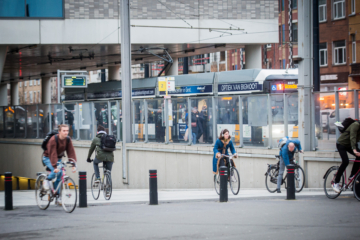ROAD SAFETY

Since 2018, the number of traffic casualties in Flanders has risen again. Currently, the figures are stagnating, but the risk of accidents with injuries remains high for vulnerable road users in Flanders. And that while traffic should be safe for all users and modes. We want to change this by focusing on transparent policy, training on safe behavior, infrastructure improvements, legislation and enforcement.
Objectives
The Flemish Road Safety Plan shapes the policy on road safety in Flanders. It puts the active road user at the center of its ambitions and works toward 9 goals:
1. Safe, well-maintained infrastructure
2. Continuous training and awareness
3. Clear regulations
4. Strong collaborations with road safety partners and all road users.
5. Research, evaluation and monitoring
6. Focus on new developments in transportation, vehicle technology and innovation
7. Efficient enforcement chain for quality enforcement policy
8. Development of sustainable mobility
9. Objective and subjective feelings of traffic (in)safety as a quality condition
37 measures have been proposed, with the overarching goal of making significant progress in 3 key problem areas: drunk driving, speeding and distracted driving. We are aiming for 25% fewer fatal crashes by 2025 and 30% fewer by 2030, with 2019 as a benchmark. By 2050, no more pedestrians or cyclists should die on Flemish roads (Vision Zero).
Innovating for road safety
The Mobility Innovative Approach (MIA) method of working focuses on simplicity, accelerated output, participation and a bot- tom-up approach to improve road safety. With MIA, we want to eliminate cumbersome bureaucratic structures, cooperate with citizens, municipalities, provinces and experts, and monitor measures to intervene in time. Through pilot projects, unsafe traffic points and bicycle infrastructure are addressed in a realistic way. After a positive evaluation, these pilot investments will then be rolled out across Flanders.
Together for safer traffic
Vision Zero and road safety are common goals for many countries and international organizations. As indicated, the figures are unfortunately stagnating in Flanders. Time to take action. We are very interested in best practices from other regions and countries, but are also ready to share our own expertise.
Article provided by our partner
Flanders policy area of Mobility and Public Works

Latest insights & stories

Seven cybersecurity trends and threats for 2025
Last year saw another alarming increase in cyber-attacks, with hackers using increasingly sophisticated methods. Proximus NXT and its security partners explain how to navigate a minefield of vulnerabilities in 2025.
IT is innovating faster than ever. We should embrace the limitless possibilities in cloud adoption, generative and non-generative artificial intelligence and the increasing use of APIs, says our expert panel. At the same time, cyber criminals see such trends as opportunities to compromise businesses and are capitalizing on new vulnerabilities.

The az groeninge hospital innovates care with 5G
A private 5G network at az groeninge provides the platform for the hospital to roll out innovation. From remote monitoring with biosensors to robotic surgery and training using VR: everything is focused on patient care.

Why your AI project is also a data project
AI needs quality data to realize its full potential. Yashfeen Saiyid, Data & AI Practice Lead at Proximus NXT, explains how to use a data-driven approach to lay the foundations for a successful AI project.
“There are more and more business applications, these days, based on artificial intelligence. And the accelerating rise of generative AI, with ChatGPT as its flagship, is simply breathtaking. According to Gartner, 90% of companies will use AI in the workplace by 2025,” begins Yashfeen Saiyid, Data & AI Practice Lead at Proximus NXT and Managing Director at Codit.